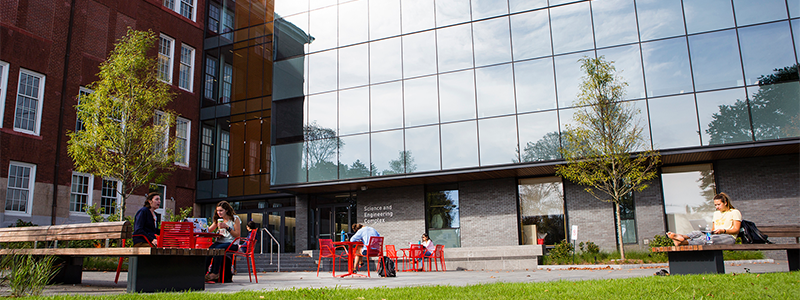Co-Op Programs

The Departments of Biomedical Engineering, Computer Science, and Mechanical Engineering each offer cooperative education opportunities for students in their undergraduate programs.
The programs provide on-the-job experiences for undergraduate students interested in learning more about career opportunities in their fields, and create opportunities for students to network with and learn new skills from working professionals.
Before beginning their off-campus work, co-op students complete a preliminary course in basic employment competencies, which include information related to professionalism, business etiquette, and ethics in the workplace, basic resume and interviewing skills, and other job skills related to working in a science-based position.
Frequently Asked Questions
-
A: School of Engineering sophomores, juniors, and seniors in good academic standing in the Departments of Biomedical Engineering, Computer Science, and Mechanical Engineering. Students majoring in other departments or in the School of Arts and Sciences are not currently eligible to participate.
-
A: No, this program is optional for undergraduate students from participating departments.
-
Yes.
-
A: Tufts has relationships with some local companies, and is working to build more. You are welcome to find your own fall or spring co-op with a company of your choosing as well.
-
A:
- All offers of employment are coordinated through the Tufts Career Center. This policy allows students to view all of their co-op offers at one time, maximizes the number of opportunities for students by posting alternates, and keeps the Career Center aware of students' choices, thereby allowing each student to make the best informed decision. Companies will post their co-op opportunities to Handshake. Offers must be in writing and include title, pay, and any benefits available to the student.
- Employment offers are made for both cycles. Students who receive more than one prime offer must decline some offers, which are then made available to the next candidate, and so on. Employers consider alternative candidates to increase their chances of hiring students for positions. Companies do not automatically take a Tufts co-op – they post the opportunity and work with the student. Tufts academic and career advisors provide support and help ensure that the opportunity is worthwhile.
- Upon notification of a student's acceptance, the employer shall send the written offer, with salary and benefit information, to the student, who will provide a copy to the Tufts Career Center. It is understood that co-op salaries and housing benefits vary widely across industries and locations.
- All offers of employment are coordinated through the Tufts Career Center. This policy allows students to view all of their co-op offers at one time, maximizes the number of opportunities for students by posting alternates, and keeps the Career Center aware of students' choices, thereby allowing each student to make the best informed decision. Companies will post their co-op opportunities to Handshake. Offers must be in writing and include title, pay, and any benefits available to the student.
-
A: Students doing a co-op are still considered enrolled at Tufts. However, the co-op semester does not count as a semester of residency towards the residency requirement.
-
A: You will be doing your co-op via Curricular Practical Training (CPT). For all queries regarding international student participation in the co-op program, please contact the International Center.
-
A: You will not be enrolled in any classes and you will not receive academic credit during the period of your co-op.
-
A: Yes, you will be considered a full-time Tufts student during the time you are participating in your co-op. This means, for example, that you will be eligible to stay in on-campus housing, use the library, attend events, and participate in varsity or club athletics. If you have student loans, you will be represented as a full-time student to the federal government and your loans will continue to be deferred during your co-op.
-
A: You will not be charged tuition for your co-op. As a full-time student, you will still be charged mandatory fees such as the activity fee and the health service fee, and you must continue to be covered by a health insurance plan.
-
A: Because you will not be charged tuition, you will not receive financial aid during your co-op. Tufts assumes that most students will be paid enough during their co-op period to cover their living expenses. If you need additional funds to help pay for living expenses during your co-op period, you may be eligible for a student loan. Co-op earnings will not count towards your financial aid eligibility when you apply for financial aid in future years. Contact the Financial Aid office for further details.
-
A: School of Engineering students majoring in the Departments of Biomedical Engineering, Computer Science, and Mechanical Engineering may participate. That includes the Data Science and Human Factors Engineering majors. Students enrolled in other Engineering departments and in the School of Arts and Sciences are not currently eligible for the co-op program.